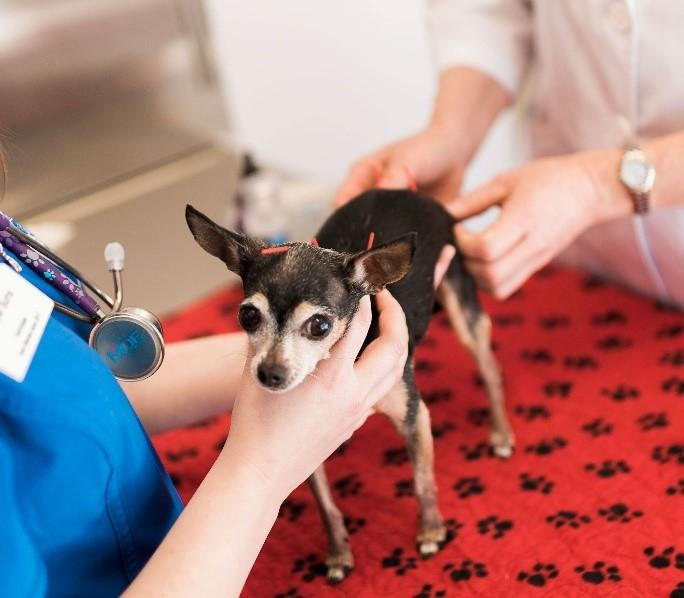
- posted: Apr. 17, 2023
Acupuncture is becoming more and more popular in the treatment of both humans and animals. The technique has been in use in veterinary practice in China for thousands of years. It is used all around the world, either alone or in conjunction with western medicine, to treat a wide variety of conditions in every species of animal. Acupuncture will not cure every condition, but it can work very well when it is indicated.
How does acupuncture work? With the use of modern technology such as an MRI, scientists examined 15 different acupuncture points in an attempt to prove how it works. With the proper point selection, method of stimulation and duration of stimulation the results show specific changes in the central nervous system. It was shown that these points have specific pain relieving properties in the brainstem. In other conditions acupuncture can assist the body to heal by affecting certain physiologic changes. For example, acupuncture can stimulate nerves, increase blood circulation, relieve muscle spasm and cause the release of hormones such as endorphins and cortisol.
When should acupuncture be considered? At the Buellton Veterinary Clinic Dr. Tina Taylor has been certified in acupuncture for many years and uses it for a variety of ailments. Dr. Mary Margaret Gross has recently become certified as well. Together they make a strong team in both pain management and degenerative neurologic disease as well a valuable addition to the treatment of both acute and chronic diseases of the kidneys and GI tract. It has also proved useful in some chronic ailments like cancer as an appetite stimulant to help improve quality of life.
How long do the treatments last and how often are they given? Acupuncture is not usually like giving a pain pill or an antibiotic, showing almost immediate results. It works to help put the body back in balance and sometimes requires maintenance treatments for chronic conditions such as arthritis or chronic kidney and GI disease. Similar to some other alternative therapies such as homeopathy and herbs, it does not suppress the condition alone but helps the body do the work. A simple acute problem such as a sprain may only require one treatment, whereas more severe or chronic ailments may need several or continuous treatments. A positive response is often seen by the third to sixth treatment and can then be tapered off so the greatest amount of symptom free time lapses between them.
Is acupuncture safe for animals? For most small animals, the insertion of acupuncture needles by a trained individual is virtually painless. Once the needles are in place there should be no pain. Most animals become very relaxed and may even become sleepy. Not all animals (like people) are not good candidates for acupuncture. Anxiety can easily counteract the effects of acupuncture. BVC has a separate room somewhat removed from the noise of the hospital and other exams rooms with soft music and dim lights if needed.
In closing, please don’t hesitate to ask if you think acupuncture may benefit your pet’s quality of life. We are here to help.
